
- Home
- About Us
- Sustainability
- Investors
- News
- People & Culture
-
Regions
Artificial intelligence (AI) is potentially the most powerful tool for inclusive growth in Africa, but the continent is in a race against time and must act with urgency to overcome the risk of further inequality and the creation a digital underclass. This is according to the continent’s largest mobile operator MTN Group.
“We must be obsessed and paranoid about not being left behind,” MTN Group President and Chief Executive Officer Ralph Mupita told The Kgalema Motlanthe Foundation (KMF) Inclusive Growth Forum over the weekend.
He said Africa’s path to inclusive AI required speedy action on six fronts.
Firstly, AI needs more abundant electricity supplies to drive economic growth. The IEA has estimated that Africa’s energy and climate-related goals by 2030 require annual investments of more than US$200 billion. The International Monetary Fund has said that all data centres combined use as much power as some of the world’s largest economies, and data centre power demand may triple by 2030.
As Africa has less than 2% of global data centre capacity, Mupita said it needs to invest heavily in digital infrastructure, beyond investment in fibre and subsea cables. The International Telecommunication Union has said that Africa needs around US$96 billion until 2030 to plug the digital infrastructure capex gap.
Thirdly, Africa needs to speed up the development of its own large language models (LLM) to power AI-driven solutions for its 1.5 billion people. There are more than 2 000 distinct African languages and Mupita said that fewer than 2% of them are supported by mainstream LLMs.
He was building on comments he made in New York in September on the sidelines of the United Nations General Assembly, when he took up a call to action from Nigeria for MTN Group to support the collection of datasets of African languages, including funding academic research into the continent’s languages.
This followed the launch of the Nigerian Atlas for Languages & AI at Scale (N-ATLAS) – an open-source multilingual LLM designed to understand and generate Nigeria’s diverse voices and create datasets for AI solutions.
Mupita told the KMF gathering that Africa must act with urgency to develop strong digital and AI skills. “This is an opportunity to enable Africa’s rich pipeline of youth, which will make up the world’s largest workforce by 2050,” he said, adding that by 2030, there would be an estimated 230 million digital jobs in sub-Saharan Africa.
“We must ensure that new jobs and augmented jobs are greater than the jobs lost, particularly with the youth divided that Africa will have.”
Calling AI a tool to solve Africa’s unique challenges, particular in high impact sectors, Mupita said Africa needed to combine traditional AI and generative AI for the greatest value across key use cases in key sectors such as healthcare, education and agriculture.
Finally, he said if Africa was to turn its ambition into reality and create – not merely consume – AI, partnerships were essential. “To give African AI initiatives scale and joint success, governments, the private sector and civil society must partner on policy, data governance and skills development. And we must do this without delay.”

MTN Group has once again been recognised for its leadership in capital markets stakeholder engagement at the 2025 Extel Europe & Emerging EMEA Equities Awards, for executive teams. This survey, compiled independently by Extel, is among the most globally respected measures of corporate performance in Investor Relations, reflecting the feedback of a wide spectrum of institutional investors, analysts and broader capital markets stakeholders.
The 2025 survey for Emerging EMEA specifically drew responses from over 460 voters, nominating 608 individuals from 304 companies. Overall, respondents were up by 14% from last year, with votes weighted across a wide set of performance attributes. These measures included management credibility and leadership, capital allocation, productivity of investor engagements, quality of investor events, granularity of disclosures and ESG metrics; underscoring the robustness of the results as a reflection of market sentiment and perceptions.
Against this rigorous benchmark, MTN was excited to be named Best Corporate in Investor Relations and Best Team in Investor Relations, in the Large Cap EMEA-TMT sector, with the Group also ranked first in the Most Honoured Companies category.
MTN was further distinguished within its sector, ranking first with stakeholders in the EMEA-TMT across eight award categories: Best Company Board, Best CEO – Ralph Mupita, Best CFO – Tsholofelo Molefe, Best Investor Relations Professional – Thato Motlanthe, Best Investor Relations Team, Best Investor Relations Program, Best Investor/Analyst Event and Best ESG Program.
“The work to safeguard and enhance MTN’s reputation with our capital markets stakeholders is a major priority for us. We are humbled by this recognition and grateful to investors and analysts for their continued engagement,” said Tsholofelo Molefe, MTN Group Chief Financial Officer, adding: “These awards are a testament to the hard work of our Investor Relations team and the collaboration across MTN to ensure that we communicate openly, consistently and with integrity. We remain committed to strengthening trust through financial discipline, transparent reporting and constructive dialogue with all our stakeholders.”
“The scope and scale of the Extel survey make the recognition especially meaningful. It is shared with the colleagues across the organisation that we work with every day, and we are deeply appreciative of the confidence placed in MTN by the investment community,” said Thato Motlanthe, MTN Group Executive for Investor Relations. “We will continue to focus on providing clear and timely insights, while listening closely to the perspectives of our stakeholders, as we work to build enduring relationships that support MTN’s long-term success,” he added.
The recognition extends MTN’s consistent record in the Extel Europe & Emerging EMEA Equities Awards and reinforces its standing as a leading African multinational with a sustained reputation for effective capital markets engagement.
MTN Group, in partnership with the University of Johannesburg (UJ) and the African Editors Forum (TAEF), today launched the Pan-African Media Innovation Programme (MIP), a continental initiative to equip journalists with the skills, tools, and networks required to navigate a rapidly changing information environment.
The programme builds on the success of the MTN Nigeria MIP, established in 2022, and now extends the model to media practitioners across MTN’s footprint. It offers a certified 12-week curriculum, delivered independently by UJ and TAEF, which combines online academic modules with in-person immersion in Johannesburg. Participants will explore digital transformation, the sustainability of independent media, ethics and law, entrepreneurship, and the impact of platforms and emerging technologies on the information ecosystem. Industry masterclasses, newsroom visits, and innovation projects will connect academic learning to practice.
The launch comes at a time when Africa, like the rest of the world, faces rising levels of fake news, coordinated disinformation, and fragile business models. Strengthening media resilience is critical to advancing the African Union’s Agenda 2063 goal of inclusive, informed, and democratic societies. For MTN, the initiative also aligns with its role as a trusted partner to the countries where it operates, ensuring that connectivity supports not only digital access but also the institutions that safeguard trust.
Speaking at the launch, Nompilo Morafo, MTN Group Chief Sustainability and Corporate Affairs Officer said, “Africa’s digital future depends on both the infrastructure we build and the strength of the institutions that foster trust and accountability. Through the Pan-African MIP, we are investing in media capacity and innovation alongside respected academic and editorial partners. Together we aim to strengthen the information ecosystems that are essential for resilient democracies and inclusive growth.”
UJ spokesperson added, “Our partnership ensures that the programme is rooted in academic rigour while responsive to the realities of newsrooms. Equipping journalists with the skills to navigate disruption and build sustainable models is critical for the future of the profession.”
African Editors Forum spokesperson said, “Editors across Africa welcome this initiative. Independent media are indispensable to democratic governance, and partnerships such as this provide a pathway to greater resilience, collaboration, and trust.”
The launch, held at MTN’s Innovation Centre in Johannesburg, coincided with a visit from Nigerian journalists representing the MIP Alumni Association, symbolising the transition from a national programme to a Pan-African platform. The first cohort of fellows will begin in 2026.

MTN Group has embarked on an exciting journey to leverage responsible Artificial Intelligence (AI) to reshape Africa at the leading edge of technology, igniting change, inspiring progress and creating a brighter future for generations to come.
“AI is no longer an enabler — it’s the engine reshaping businesses, redefining value creation and rewriting the rules of global innovation and competitiveness,” says MTN Group Digital Infrastructure CEO and GCTIO Mazen Mroué. “AI is not just about automation — it’s about boosting human potential, increasingly becoming seamlessly embedded into our daily activities, decisions and experiences, transforming how we live and work.”
He says AI is augmenting human intelligence like never before and “we at MTN are developing AI for Africa by Africans, unlocking sustainable value for all”.
According to PwC’s Global Artificial Intelligence Study, AI can transform global productivity and economic activity and is predicted to add US$15.7 trillion to the global economy by 2030.
Assuming Africa captures 10% of the global AI market, a recent SAP report projects that AI could add US$1.5 trillion to the continent’s economy by 2030. The SAP report also predicts that 230 million new digital jobs will be created in Africa by 2030. Statista projects that the AI market in Africa could reach US$4.51 billion in 2025 and grow to US$18.7 billion by 2030.
As AI adoption accelerates, the GSMA says it is crucial that it is designed, developed and deployed with ethical considerations in mind. As a result, the industry association collaborated with a group of operators and others to co-create a Responsible AI Maturity Roadmap, supporting the advancement of innovative and trustworthy AI applications.
MTN’s AI journey is designed around three key principles, in line with global best practice. These encompass a comprehensive governance structure aspiring to achieve ethical, effective and safe AI adoption; an agile and scalable operating model for measured AI implementation; and targeted use cases that deliver tangible value.
MTN has developed a world-class Responsible AI Policy to guide AI deployment and usage. It has also set up a special sub-committee of the Executive Committee to provide oversight, execution governance and impact management of the Group’s IT governance, with a special focus on AI.
As data quality, talent excellence, strategic partnerships and robust infrastructure are all essential to a successful AI implementation journey, MTN has designed an appropriate operating model and established an in-house AI Centre of Excellence (CoE) alongside a Cloud CoE to co-ordinate AI activities across the Group, supported by an internal Software Solutions team equipped with more than 300 engineers.
Driven to deliver tangible value for customers, communities and the business, MTN has identified numerous AI use cases across key business domains including Network, Finance, HR and Commercial functions.
“At MTN Group, under the group-wide transformation programme branded as ‘MTN Genova’, we are operationalising AI at scale to boost productivity, elevate customer experience, reduce costs and accelerate revenue generation,” says Mroué.
Through our strategic partnerships, we have adopted enterprise-grade Open AI and cloud-native services to implement AI and generative AI solutions powered by large and small language models (LLMs and SLMs). In parallel, we are promoting innovative collaborations with start-ups focused on local language LLMs to elevate customer experience solutions.
In the network domain, MTN is promoting interesting use cases like intelligent AI-enabled fuel consumption savings for data centres in South Africa; AI-driven cell site dynamic energy management in Benin; AI-driven fibre cut sensing in Côte d’Ivoire; and network traffic balancing and optimisation in Nigeria.
Accra, Ghana, June 22, 2025 – Demonstrating its commitment to advancing Africa’s development, MTN Group supported the 2025 Economic Governance School training for public officials from Ghana, South Africa and Kenya held in Accra last week.
The initiative, the result of collaboration between South Africa’s National School of Government (NSG), the Kenya School of Government (KSG) and the Ghana Institute of Management and Public Administration (GIMPA), is designed to strengthen senior leadership in the public sector and promote inclusive economic governance across the continent. It brings together legislatures, politicians and senior officials from all levels of the public service for a week of peer learning, policy dialogue and institutional exchange. Consequently, the delegation took time to visit the African Continental Free Trade Area (AfCFTA) Secretariat, which is charged with coordinating the creation of a single continental market for goods and services across Africa.
“As a pan-African business, we understand that Africa’s growth depends not only on investment in infrastructure, but also in people and institutions,” said Nompilo Morafo, MTN Group Chief Sustainability and Corporate Affairs Officer.
Since the training took place during MTN Group’s flagship 21 Days of Y’ello Care, the delegation also visited the MTN Ghana supported Opportunities Industrialisation Centre (OICG), which provides vocational, digital and entrepreneurial skills training for young people to enable them to earn a decent and dignified living.
“At MTN, we believe that everyone deserves the benefits of a modern connected life; therefore, in our view, education, training and strong institutions form the foundation for sustained progress. Also, when civil servants, policymakers and administrators are equipped with high-quality training, their collective decisions shape a more equitable, innovative and resilient future for their nations.”
MTN’s involvement reflects its broader approach to driving Africa’s progress through investment in leadership and institutional capacity. In addition to sponsoring the NSG, KSG and GIMPA programme, the Group contributed to the discourse, with senior executives participating in sessions focused on telecommunications, digital transformation, artificial intelligence and infrastructure financing.
MTN Ghana CEO Stephen Blewett and CIO Bernard Acquah joined Morafo in engaging on panels that explored the intersection of technology and governance. Discussions focused on the digital transformation of public services and the role of AI and infrastructure investment in supporting state capacity and economic inclusion.
South Africa’s Deputy Minister of Public Service and Administration Ms. Pinky Kekana, described the initiative as a valuable platform for engagement on governance challenges, saying: “The Economic Governance School offers a unique platform for elected and appointed public leaders to engage in critical analysis and reflective dialogue on the complex challenges confronting governance.”
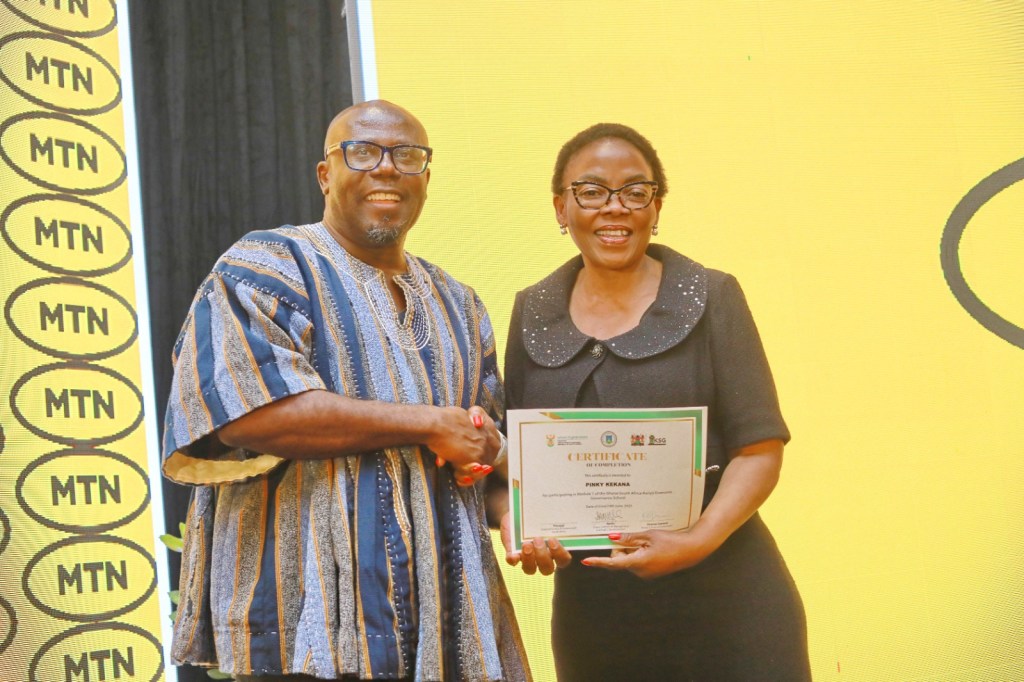
Director of GIMPA, Prof. Samuel Kwadwo Bonsu, welcomed MTN’s contribution and the cross-sector collaboration underpinning the programme: “We are proud as GIMPA to serve, not only as a centre of learning but as a convening ground for critical reflection and collaboration.”
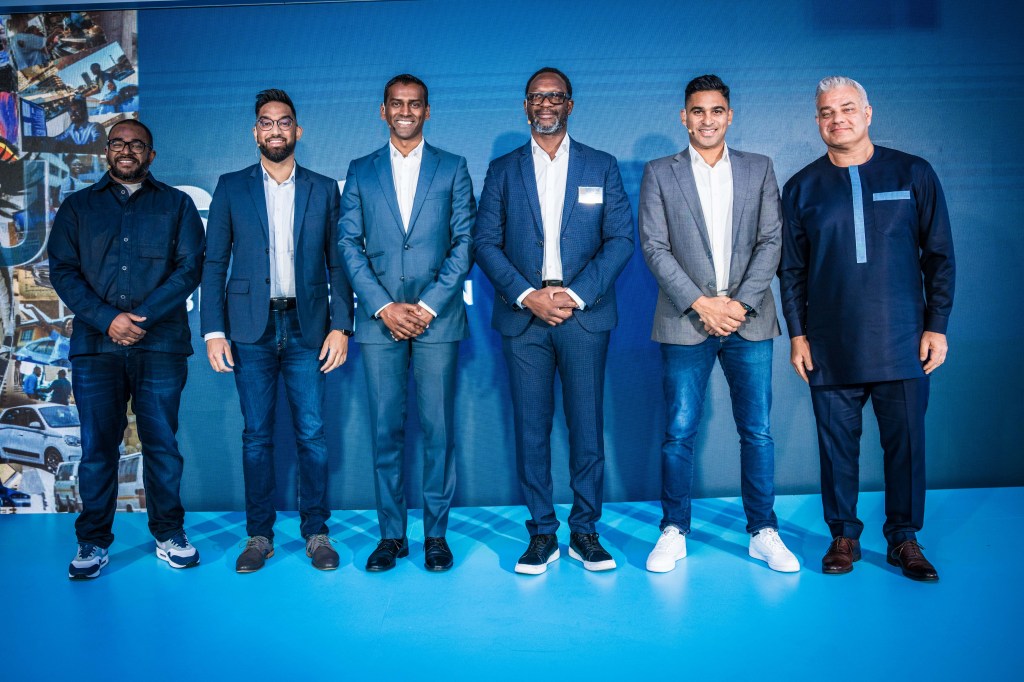
MTN and its digital platform business, Chenosis, in partnership with TransUnion Africa, has launched TransUnion Telco Data Score, a first-of-its-kind credit scoring solution that uses mobile phone call data records to help millions of South Africans with limited or no formal credit history gain access to financial services.
This alternative data scoring model leverages Call Data Records (CDR), which reflect patterns in mobile phone network usage behaviour and correlates it to an individual’s financial behaviour. By using telco data as a proxy for financial reliability, the TransUnion Telco Data Score enables lenders to accurately assess New-to-Credit (NTC) consumers and expand access to safe, affordable credit.
Helping the Financially Excluded
According to TransUnion estimates, over 1.4 million credit-invisible South Africans open new credit accounts each year, contributing to more than four million new accounts over the past three years. Yet traditional scoring models often fail to assess this segment accurately, leaving more than 16 million adults outside the formal credit system.
Approximately 35% of New-to-Credit consumers are under the age of 25, many of whom are new to the workforce and often use credit to buy clothing for work, highlighting the need for innovative tools that support younger, digitally active individuals who may lack a conventional credit footprint. Successfully integrating these and other excluded consumers into the economy could add approximately R173 billion1 to South Africa’s GDP.
“With over 500 million2 people across the continent excluded from formal financial systems, the scale of the challenge is undeniable. Traditional data models fail to reflect the realities of African consumers, leaving millions without access to credit and the opportunities it enables. Financial inclusion isn’t just part of our mission, it’s our mandate,” said Lee Naik, CEO of TransUnion Africa.
“That’s why we believe the only way forward is to think differently, to lead with bold, African-born solutions. Innovations like TransUnion Telco Data Score, designed for Africa, by Africa, are helping us responsibly harness mobile data at scale. In doing so, we’re not only expanding access to credit, but we’re also unlocking economic potential, accelerating inclusive growth, and reshaping the future of finance across the continent.”
Creating Opportunity with Consent and Compliance
The use of CDR data is subject to explicit consumer consent and is managed in compliance with South Africa’s Protection of Personal Information Act (POPIA). MTN is responsible for consent management and will ensure that Chenosis, MTN’s API marketplace, facilitates the connection between MTN’s data ecosystem and partners like TransUnion in a secure and scalable manner.
“This partnership demonstrates how mobile technology and secure data sharing can support positive change in the financial sector and unlock new opportunities for millions of South Africans,” said Selorm Adadevoh, Group Chief Commercial Officer, MTN Group. “We are committed to ensuring that data is used responsibly, with the customer’s interests at the forefront. This is a model of what responsible innovation can look like.”
Empowering Lenders and Growing the Economy
For lenders, the TransUnion Telco Data Score has demonstrated a 25–35% improvement in predictive performance over previous alternative data models, based on recent pre-launch validations across the retail and banking sectors.
By adopting TransUnion Telco Data Score, lenders can better predict user behaviour and support responsible lending by ensuring that credit users at risk of default are not overexposed and can be effectively supported throughout their credit journey.
Importantly, the product also helps New-to-Credit consumers establish and build their credit footprint over time. According to TransUnion data, low-risk individuals significantly increase their credit exposure within 18 months of becoming credit active, underscoring the long-term benefits of responsible financial inclusion strategies.
“With Chenosis, we enable collaboration between mobile operators and solution providers while maintaining high security and compliance standards,” said Waseem Amra, GM – Products and Platforms. “This partnership highlights how secure data access can support innovation in financial services that can transform lives.”
This partnership between Transunion Africa, MTN, and Chenosis reflects the growing trend of using diverse data sources to create more accurate and inclusive financial access. Integrating mobile network insights into credit scoring provides a practical and scalable way to reach more individuals, while maintaining high standards of privacy and compliance.
“With this inclusive innovation, TransUnion has taken the lead in creating an impactful solution to one of the continent’s most pressing challenges – finding responsible pathways to greater financial inclusion that will unlock opportunities for individual and national growth. By turning mobile data into meaningful opportunity, we have set the standard in making transformation possible by showing how technology can be used in groundbreaking alternative ways. Together with MTN and Chenosis, we are building a future where every South African, regardless of their financial history, has the chance to be seen, to be trusted, and to thrive,” Naik concluded. “When financial institutions can measure risk more effectively, they can lend more confidently, and more consumers can access opportunity, and that’s a win for everyone.”

Connectivity is more than technology; it’s about opportunity, making digital inclusion a critical catalyst for the continent’s socioeconomic growth.
When people ask what progress looks like, I typically point to a classroom in rural Uganda that has digital access for the first time. Or to an entrepreneur in Cameroon using MTN’s mobile money platform, MoMo, to run her business. Or a solar-powered site in Ghana, connecting people in places that have no hard infrastructure.
For us at MTN, this is our work. It’s how we live our purpose: enabling the benefits of a modern connected life for everyone across our markets.
It is the framework that guides how we invest, partner, innovate, and govern our business. In 2024, we invested nearly R30bn in infrastructure and technology and paid income taxes of more than R10bn. These contributions matter. But it’s what they enable — such as jobs and opportunities — that defines us.
In 2024, we powered digital connectivity for 291-million people, including internet access for 158-million users and financial services for 63-million through MoMo.
About 93% of the population in our markets — or 500-million people — are now covered by our broadband network. We facilitated digital literacy for 22-million people, promoting meaningful participation in the digital economy. Through our GSM network and MoMo businesses, we supported 3.5-million indirect jobs.
Since its inception in 2007, our group-wide employee volunteerism programme — 21 Days of Y’ello Care — sees MTNers roll up their sleeves to improve the lives of their communities. Over the years, we have impacted hundreds of thousands of people. The campaign is testament to the power of collective action, reminding us that even small acts of kindness can create a ripple effect of change.
Progress is never a solo effort. It requires collaboration across public and private sectors, across borders and disciplines. Whether it’s partnering with governments to expand coverage, working with innovators to extend digital finance, or engaging civil society to deepen inclusion, we know the best results come when we listen and co-create.
Keeping consumer experiences safe is part of the responsibility we carry. We know that trust is earned and we remain focused on building resilience, protecting digital human rights, and responding transparently when challenges arise. We carry this responsibility with humility and determination. And it’s the lens through which we will continue to serve and invest.
Amid the current significant geopolitical shifts and technological developments, it’s clear that Africa needs to chart and champion its own growth and progress. If it doesn’t, there is a real risk that the continent gets left behind. Embracing technologies such as 5G, non-terrestrial networks and generative AI will be key drivers of future progress and socioeconomic development.
At MTN, we believe that there are some foundational policy positions that will be critical for technology to meaningfully drive more inclusive growth. These include:
These foundational policy positions, consistently adopted across the continent, have the power to drive structural growth of the digital economy of Africa, and realise the continent’s full potential as we look to achieve the goals of the AU Agenda 2063 and beyond.
By Ralph Mupita, MTN Group President & CEO
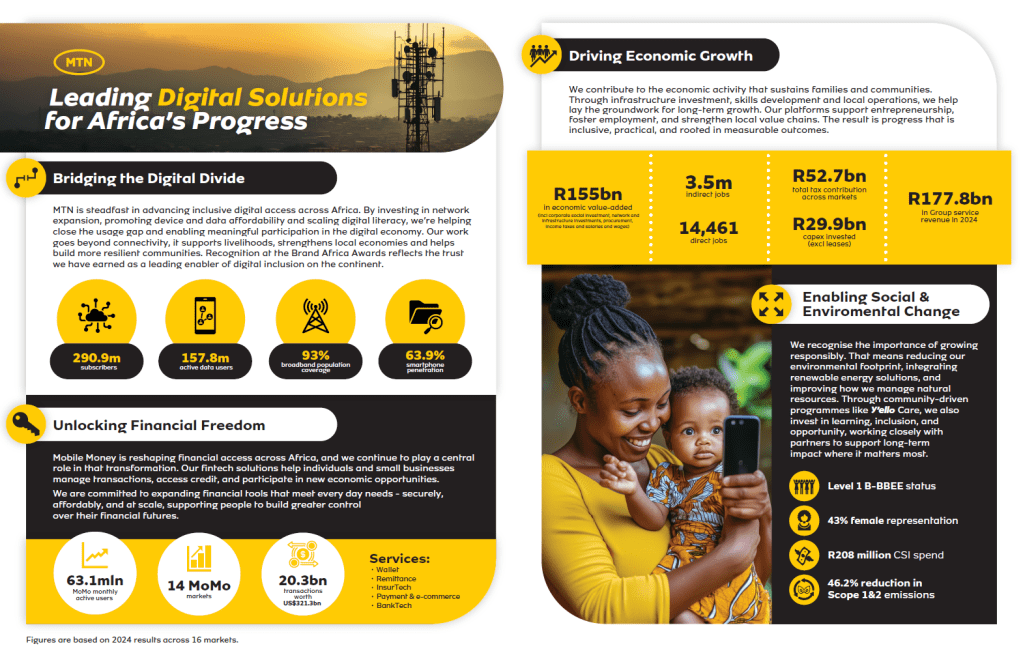
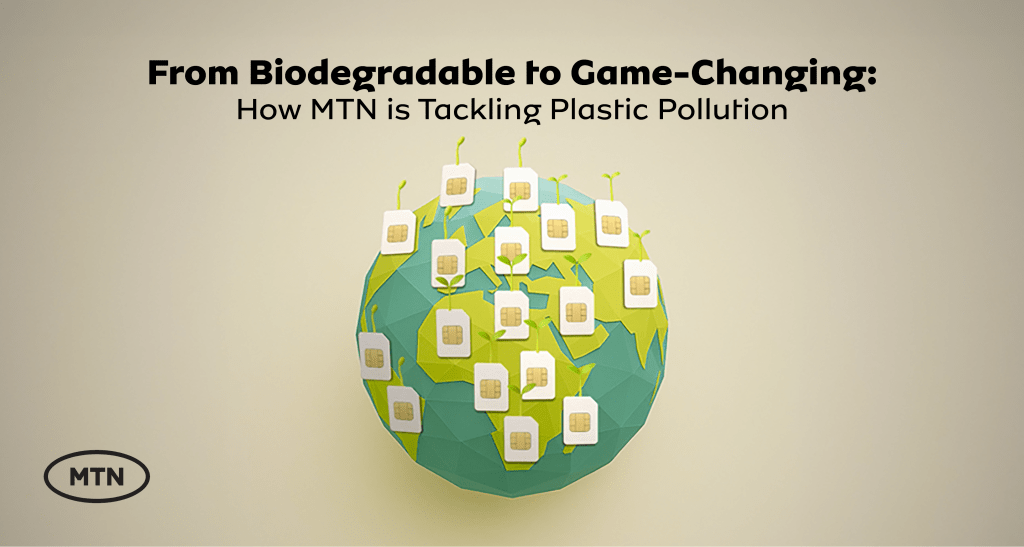
Global plastic production, exceeding 400 million tonnes annually, demonstrates that plastic pollution remains an urgent challenge. More than half of it is designed for single use. The message for World Environment Day 2025 is unequivocal, we need to beat plastic pollution, and we need to do it with urgency.
This issue touches every sector. Telecommunications is no exception. While mobile operators are typically associated with connectivity, the industry has a legacy plastics problem hiding in plain sight. In 2020 alone, approximately 4.5 billion plastic SIM cards were produced globally. These small plastic cards are widely used and rarely recycled. Many end up in landfills or as litter. Others are incinerated, contributing to emissions. They are not the most visible source of waste, but they are a meaningful one, and entirely avoidable.
At MTN, we have taken a deliberate step to reduce this form of plastic waste. In 2024, we introduced bioSIMs, SIM cards made from 100% biodegradable, FSC-certified paper. They perform exactly like plastic SIMs but break down naturally when discarded. No harmful residue. No microplastic. Just responsible design, built for a more sustainable future.
The rollout began in Rwanda and expanding across other markets. It is a practical innovation grounded in science, not sentiment. And while it won’t solve plastic pollution on its own, it is part of a larger, necessary shift in how telecoms, and business at large, approach environmental responsibility.
Africa has a central role in this conversation. The continent contributes just 3–4% of global greenhouse gas emissions, yet it faces some of the worst consequences of climate change. At the same time, Africa is grappling with an accelerating waste challenge. By 2060, annual plastic waste in sub-Saharan Africa is projected to reach 116 million tonnes, a sixfold increase from 2019. The region’s rapid urbanisation and insufficient waste infrastructure make it highly vulnerable to both climate and pollution shocks.
It’s essential. Every tonne of plastic avoided reduces long-term risk, for people, infrastructure, and the planet. Our bioSIMs are part of a broader commitment at MTN to embed sustainability across our operations. As the UNEP reminds us, the solutions are available. What we need now is implementation at scale. Scaling starts with design. The average SIM card may weigh just four grams, but multiplied across millions of users, the footprint grows quickly. A small change in design, if adopted broadly, can remove tonnes of plastic from the supply chain each year. That’s the logic behind our bioSIM. It is efficient, cost-effective, and fundamentally better for the environment.
We are also expanding eSIM adoption, which removes the need for a physical card altogether. Combined, these efforts enable our customers to reduce their impact through the choices they make every day. That is where real momentum lies, not just in corporate strategy, but in shifting consumer norms.
This World Environment Day, the message is clear. Plastic pollution is a problem that can be solved. But doing so will require collective action, practical innovation, and a willingness to change how we operate. MTN is committed to being part of that change, starting with how we connect the communities we serve.
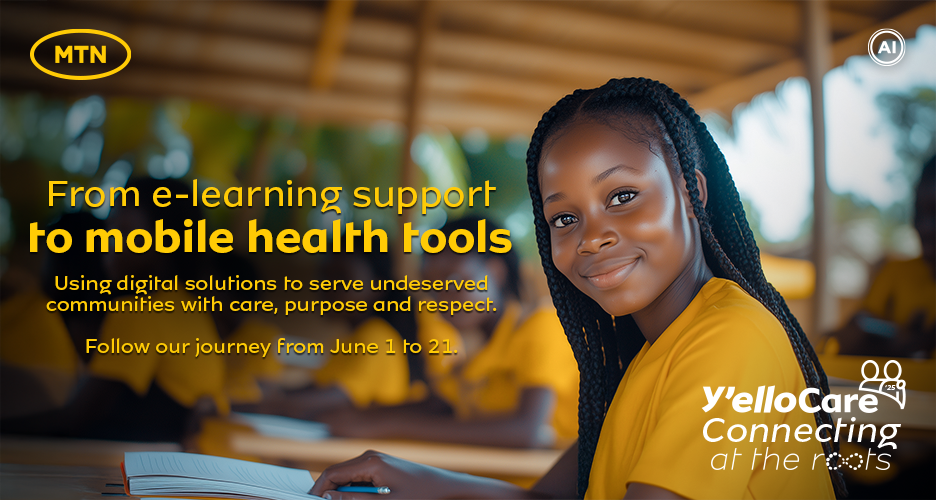
MTN Group is pleased to announce the 2025 edition of 21 Days of Y’ello Care, our highly anticipated flagship employee volunteerism campaign, taking place from 1-21 June 2025.
Now in its 18th year, Y’ello Care continues to demonstrate the power of employee-led action to drive meaningful change across the communities we serve. Since its inception, the campaign has mobilised thousands of MTN employees to support impactful initiatives focused on education, health, youth development, and economic empowerment.
Each year, the campaign evolves to reflect the most pressing needs of society, while remaining grounded in our commitment to enable the benefits of a modern connected life for everyone. Over the past 6 years, we have reached the lives of 107,034 people across our communities through the impact of 14,376 MTN volunteers completing 56,306 cumulative hours of community engagement.
This year’s theme, “Connecting at the Roots – Connecting communities through the use of digital tools,” responds to the ongoing challenge of digital exclusion, particularly in rural, remote, and underserved areas. Across many parts of Africa, limited connectivity continues to constrain access to education, healthcare, financial services, and economic opportunity. Women, youth, persons with disabilities, and displaced populations are disproportionately affected.
Y’ello Care 2025 will see MTNers across our markets implement practical, community-led initiatives that leverage technology to unlock connectivity to bridge these gaps.
“Y’ello Care reflects our belief that real progress begins at the grassroots level. In 2025, we are focusing our efforts on the communities that remain on the margins of digital access and connectivity. By applying technology in ways that are practical, inclusive, and sustainable, we are working to ensure that no one is left behind,” said Nompilo Morafo, MTN Group Chief Sustainability and Corporate Affairs Officer. “Our people remain the driving force behind this campaign, and their continued commitment to serving with purpose is what makes Y’ello Care a true embodiment of MTN’s values.”
In line with MTN’s values, the campaign prioritises meaningful partnerships, responsible delivery, and inclusive engagement. Through trusted collaborations with community stakeholders, we aim to develop practical solutions that are responsive to local contexts, respectful of community aspirations, and inclusive of those most often excluded from digital progress.
Through Y’ello Care, MTN reaffirms its belief in the transformative power of technology and in the ability of our people to be agents of positive change. We look forward to working together with communities and partners to deliver meaningful, sustainable impact where it is needed most.
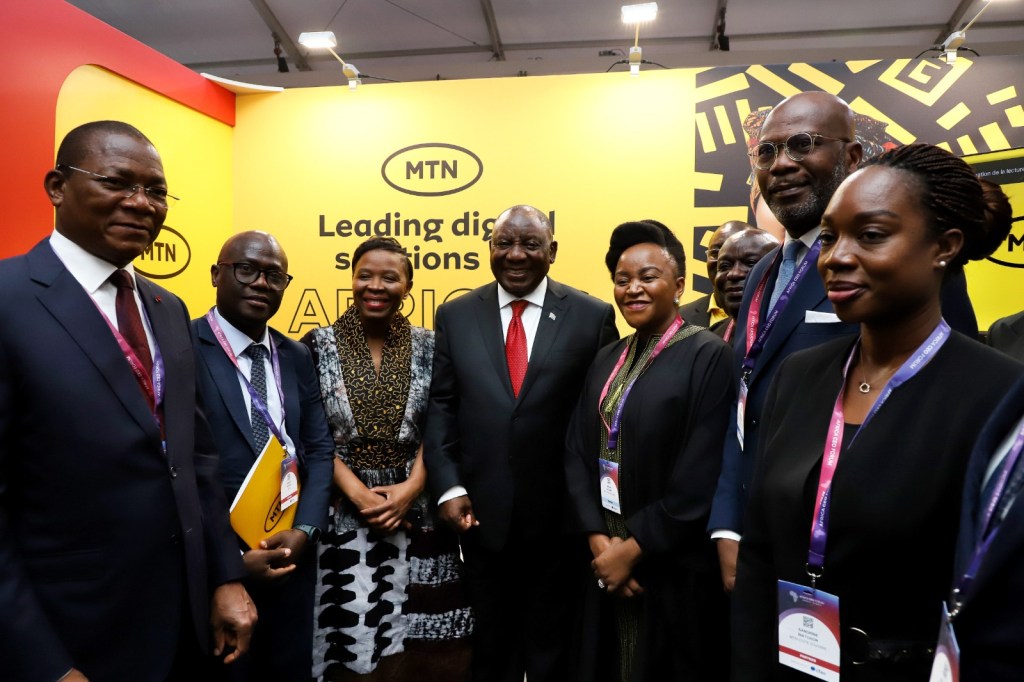
As part of our work to deepen stakeholder relations and partnerships for Africa’s progress, MTN Group is a platinum sponsor of the Africa CEO Forum, which brings together the continent’s most influential decision-makers for two days of meetings on the private sector’s key role in accelerating Africa’s development.
The 12th edition of the annual summit is taking place in Abidjan on 12–13 May 2025. Some 2 000 business leaders, investors and policy makers are in attendance to shape practical strategies to expedite Africa’s economic transformation.
The theme for 2025 is ‘Africa in a transactional world: Can a new deal between state and private sector deliver the continent a winning hand?’. It recognises the need for governments to strike a new deal with the African private sector, anchored on three pillars: an improvement of governance and accountability; targeted public policies to address Africa’s structural challenges; and the accelerated implementation of the African Continent Free Trade Agreement (AfCFTA).
“At part of our shared value priority to support Africa’s progress, we at MTN seek to align with the priorities of our continent and nation states and to actively engage governments and regulators to help shape industry dynamics,” said MTN Group Chief Sustainability and Corporate Affairs Officer Nompilo Morafo.
“MTN’s participation at the Africa CEO Forum reflects our nation states programme and our commitment to work together to enable inclusive growth,” she added, noting that escalating tensions in world geopolitics present headwinds to Africa’s budding economic recovery. “We believe the continent’s sustainable progress will come from trusted partnerships, coherent policy environments and shared investment in the systems that power Africa’s digital and economic future.”
As part of the Forum programme, MTN Group Senior Vice President: Markets, Ebenezer Asante, is participating in a panel discussion exploring tax policy and resource mobilisation. The session focuses on how public and private sector stakeholders can consult and collaborate to ensure fiscal environments that support both domestic priorities and the stability required for sustained investment.
MTN Côte d’Ivoire CEO Mitwa NG’ambi is contributing to a strategic roundtable on Africa’s digital transformation. This is looking at strategies to enhance network resilience and accelerate infrastructure deployment – particularly in underserved areas – and the role of policymakers in fostering an investment-friendly environment that accelerates digital transformation.
MTN Group’s sponsorship and participation at the Africa CEO Forum underscore our commitment to building a more connected, inclusive and prosperous Africa.